The insurance industry has been drenched in never-ending paperwork for as long as you can imagine. From data entry and underwriting to claims processing, there’s always a looming risk of process inaccuracies due to human error.
But, we can avert this risk by using intelligent automation in insurance.
With automation becoming more commonplace in insurance, insurers are looking for ways to streamline their most mundane and repetitive yet necessary activities. It is an opportunity that insurers cannot overlook. But what is intelligent automation, how are insurance companies leveraging it, and how might it apply to your business?
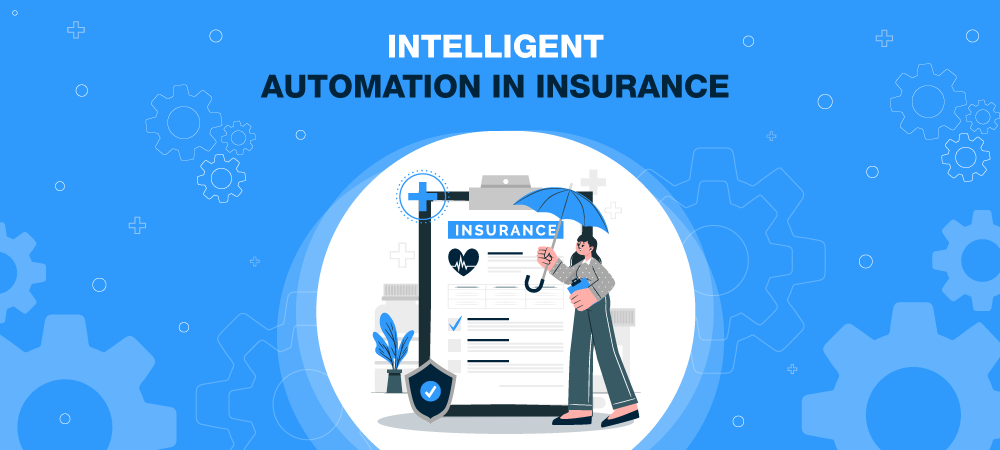
What is Intelligent Automation?
Intelligent Automation uses Artificial Intelligence, Machine Learning, and Robotic Process Automation (RPA) to build end-to-end business processes and workflows that can think, learn and modify themselves over time.
It is a holistic solution for digital transformation that has brought a revolution across industries in recent years. Independent analysts believe that companies who fail to use intelligent automation in their business processes might get left behind in the race of complete digitisation.
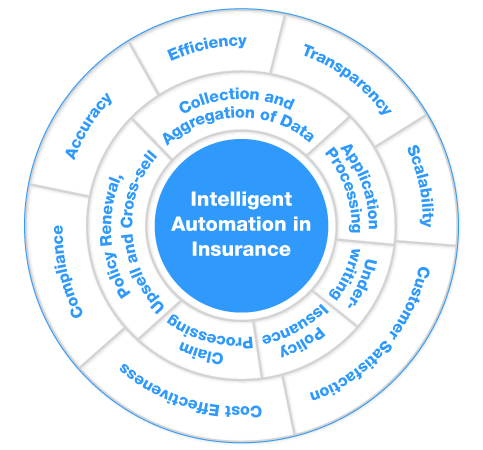
Having found its place in almost every industry, automation helps businesses:
- Transcend efficiency limitations across teams and processes
- Integrate front and back-office operations
- Reduce manual interactions and increase processing speed
- Ensure regulatory standards
- Capture and retrieve records from unstructured resources
- Identify prospect intent and engage them accordingly
- Connect different teams and processes for a seamless, 360-degree approach to every single interaction
Learn about Digital Sales & Operations in Insurance [Download Now!]
Use of Intelligent Automation in the Insurance Industry
There are multiple examples of businesses across industries leveraging automation to achieve more than just data processing. One such industry is insurance.
With the introduction of intelligent automation in insurance, the industry has seen a significant increase in its operational efficiency in a minimal amount of time. However, to get to this point, insurers have to automate almost every segment of their process.
The various process segments where intelligent automation has proved to be effective in insurance are:
1. Seamless Collection & Aggregation of Data
We’re now in a digital economy where data is more valuable than ever. It is at the center of all business operations. Hence, it is essential to organize every available datapoint in the most meaningful way to use it to its full potential.
Insurance companies today deal with mundane tasks such as data collection and data entry on an everyday basis. These tasks are not only time consuming but are also prone to inaccuracies due to human errors. With intelligent automation, insurers can now
- Capture leads from various sources such as website, third-party aggregators, social media, and more without any human intervention
- Integrate with multiple lead generation channels within no time
- Import and manage all the data automatically under one roof
- Distribute leads based on factors such as product type, language preference, location, and more
- Decrease turnaround time by prioritising data using lead and quality scoring
- Identify prospect intent with activity tracking to build a complete prospect profile, and have relevant prospect interactions
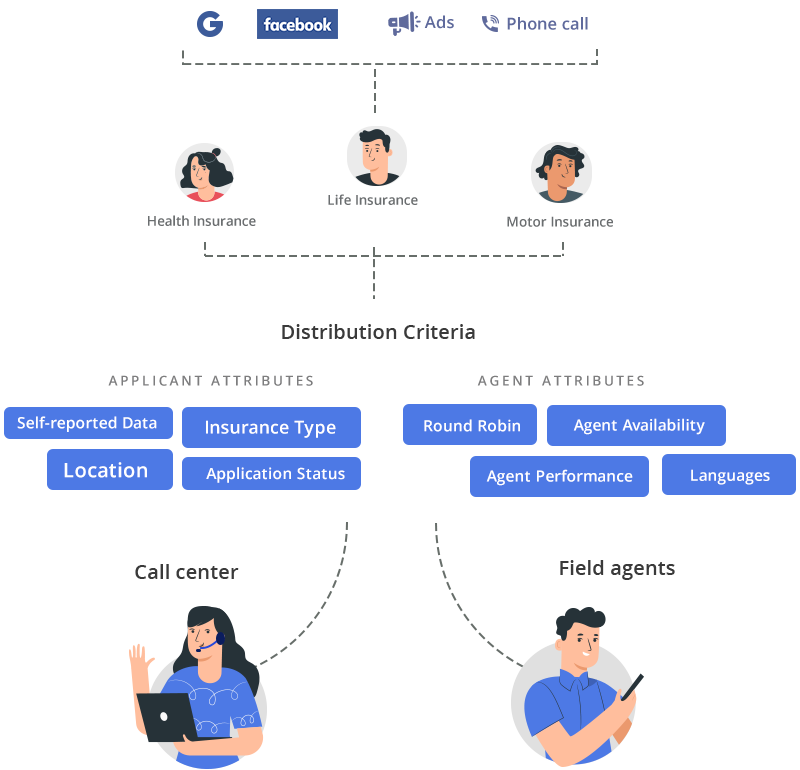
2. Self- Serve Application Processing
Onboarding customers is usually a time-consuming task. It involves multiple verifications and validations before a policy is issued. There are various risks associated with onboarding customers using traditional methods, including delays, endless documentation, and again, the risk of human error in the sign-up process.
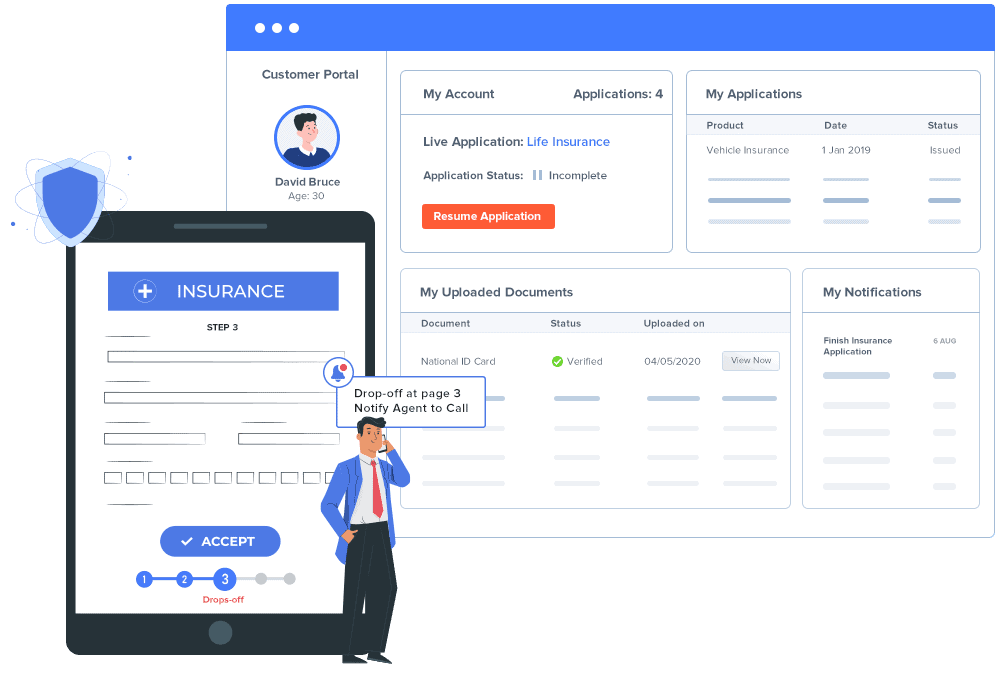
To overcome this, intelligent automation needs to be deployed in the form of digital workers. Intelligent Optical Character Recognition (iOCR) can process the paper forms to recognize the text and enter the data into multiple systems. Another substitute for this is the self-serve forms. The self-service forms allow the customer to fill in their data on the web or mobile apps before being validated by the digital worker.
But in case the applicant drops off before completing the form, automation can help bring them back by:
- Sending an automated email/SMS reminder to the applicant with a link to the form
- Notifying the call-center agent about the drop-off so he can take the required action.
Automation helps replace these highly repetitive, time-consuming, and manual processes and opens up new customer interaction modes. It also helps in freeing up the staff to handle more value-adding tasks.
3. Efficient Underwriting
Once the data is aggregated, the next step for an insurance company is to analyse the data to determine and mitigate any policy risks.
Where the underwriting process takes weeks when done by an individual, intelligent automation in insurance can help underwriters speed up this process by providing recommendations on its own. It combines the data from various disparate systems, including history for every user, and provides an informed view of his previous insurance purchases, lifestyle, etc. Simultaneously, it populates the data fields from the internal system, reviews the previous claims, and improves operational efficiency.
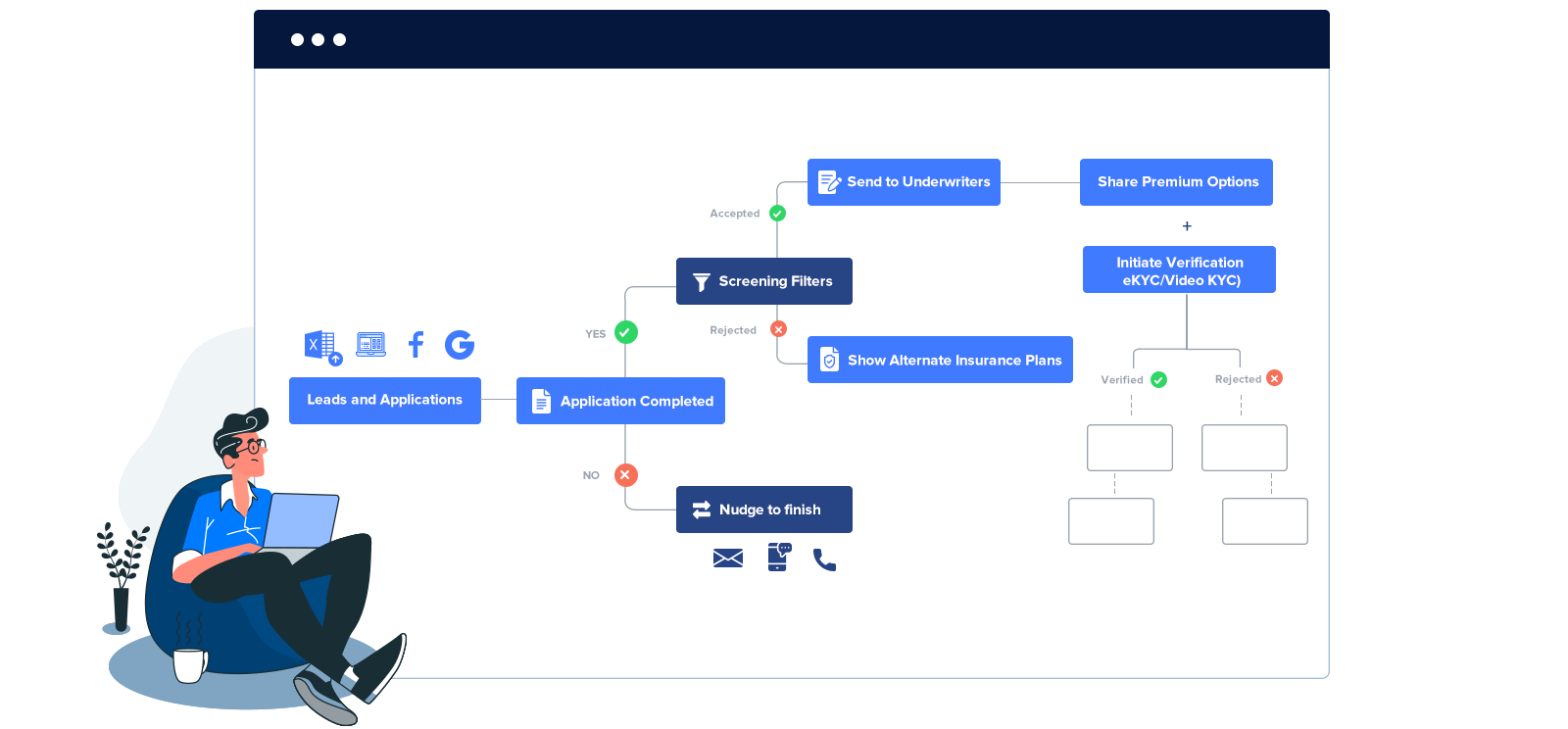
The efficiency of underwriting directly impacts the bottom-line of any business and enables rapid new business generation.
4. Faster Policy Issuance
Various insurance companies today claim to have the fastest policy issuance. But this isn’t possible if a human keeps handling all the back-office operations without any help from automation.
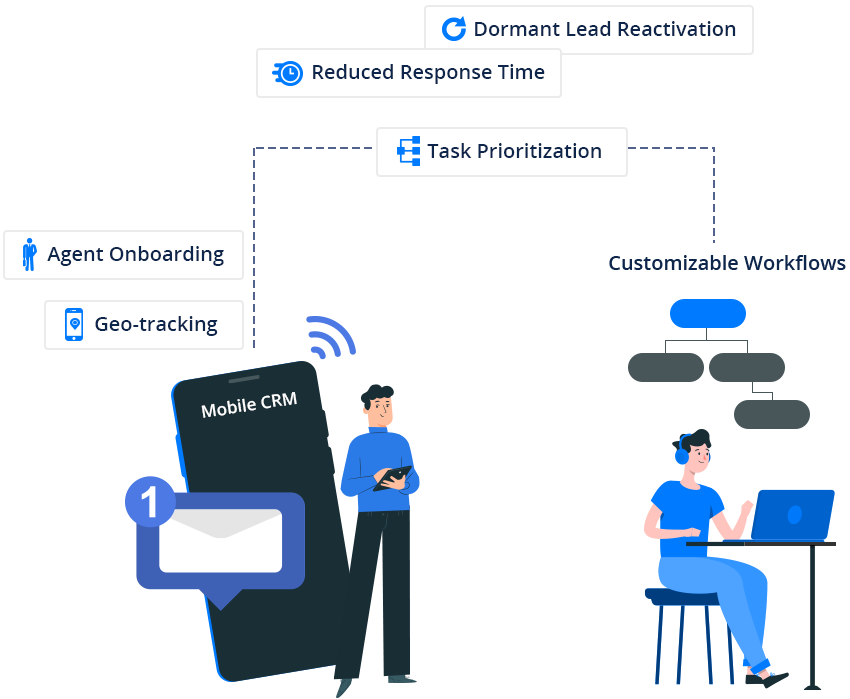
Policy management is another segment where automation proves to be effective. This includes policy issuance and policy updates. Once the underwriting decision has been made, the policy needs to be issued and data needs to be updated in the internal system accordingly. The customer also has to be updated about his policy and other benefits regularly. Intelligent automation can reduce insurance policy issuance time by getting rid of any manual work involved. It can also help keep the customer updated with all the relevant information.
5. Accelerated Claim Processing
Claims processing is one of the most essential steps in the insurance cycle. But since the process requires gathering and checking data from multiple sources, it is time-consuming and sometimes frustrating for both the insurer and the customer.
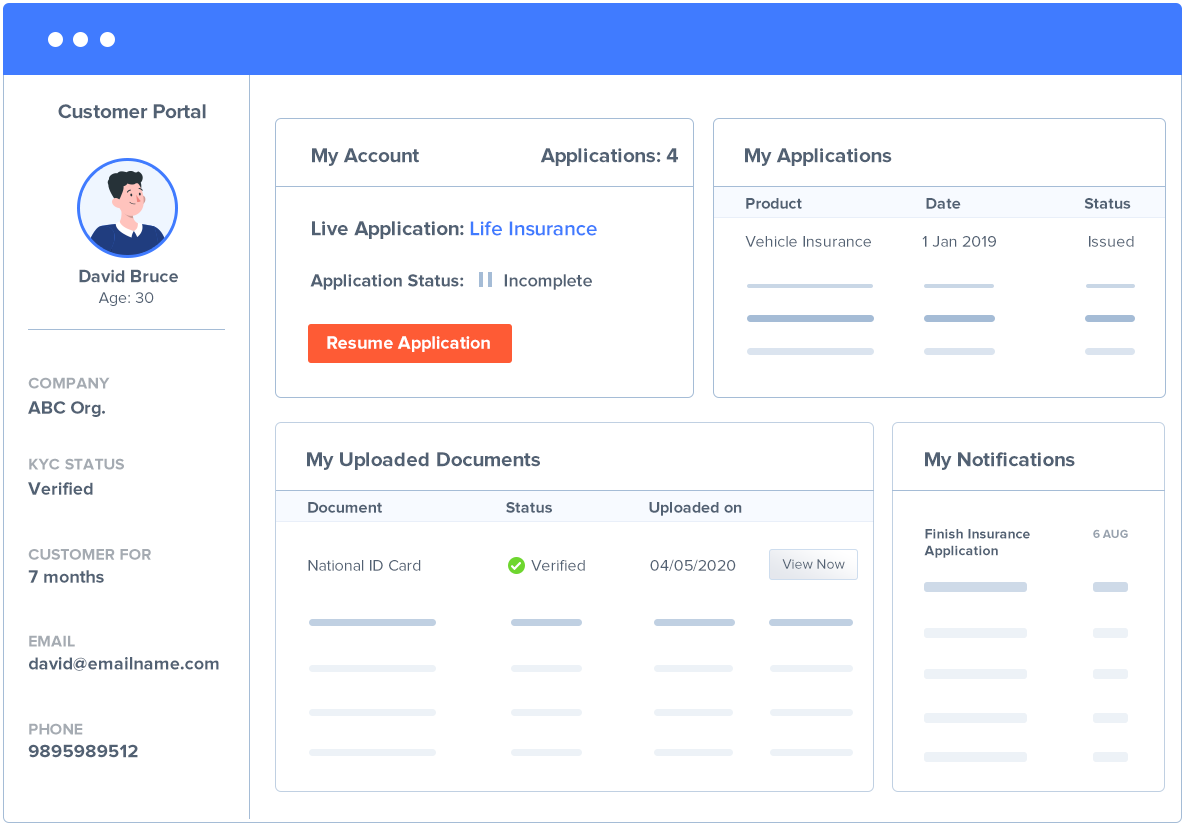
Automating the claim processing using RPA and machine learning allows proper claim classification and routing to the right agent to gather any missing information. Additionally, it removes redundant and repetitive manual tasks of extracting data from the claims form, estimates the damage, and offers real-time insights.
6. Identifying Cross-Sell & Up-Sell Opportunities
The job of an insurer does not end once a policy has been issued. The customer needs to be engaged at various intervals.
Intelligent automation in insurance identifies the right opportunity for cross-selling and up-selling. It notifies the respective agent whenever there is a possibility of selling or upgrading the policy. Automation can trigger omnichannel communication to the customers with policy renewal or policy upgrade SMSs/emails.
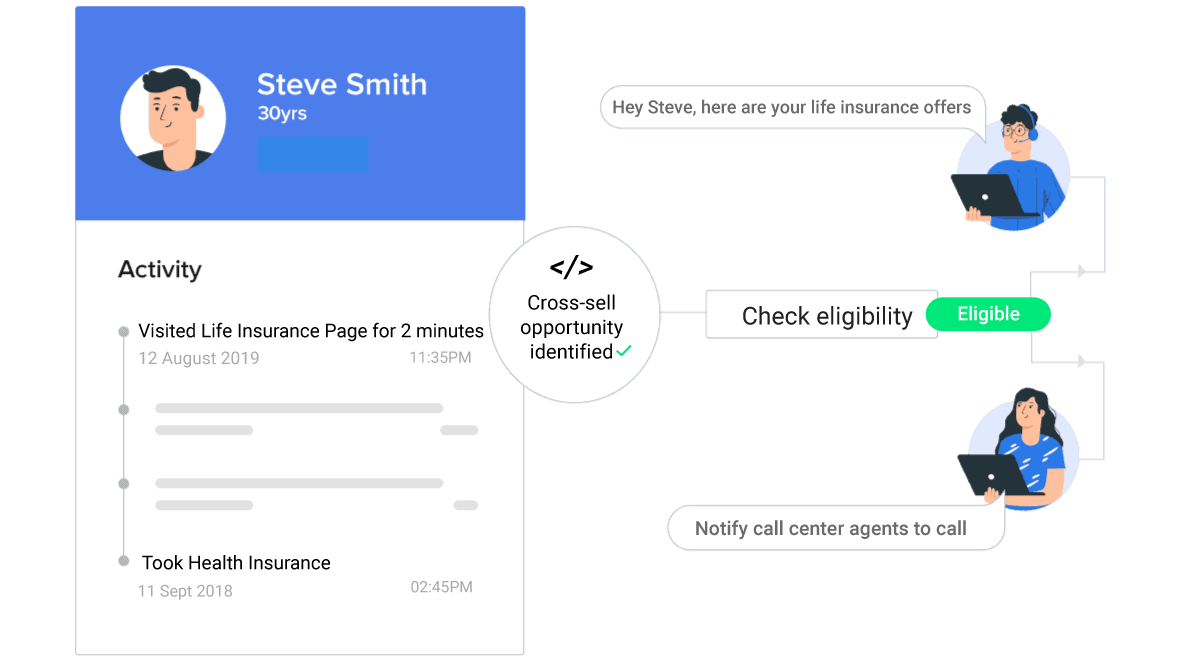
For instance, Amit, a new resident of Bangalore, just bought a car for his smooth office commute. As he’s checking out car insurance rates from various providers online, he receives a call from a sales agent who belongs to the same company from where he bought his health insurance. Figuring he’ll save money by keeping all his insurance under one roof, Amit opts to purchase a car policy from the same company. Perhaps, Amit has been on the receiving end of a selling strategy known as cross-selling without realising it.
Not only is the conversion rate of selling to an existing customer better than for a new lead, but also the product or service you’re going to offer truly benefits your client.
7. Improving Customer Interaction
Customers today need a straightforward and swift solution to their queries. In case an insurer fails to do that, he might lose a potential client.
Fortunately, intelligent automation software reduces the average handling time without compromising the call quality. The software enables the insurer to unlock the power of chatbots, virtual assistance, and other voice recognition tools to raise the service bars.
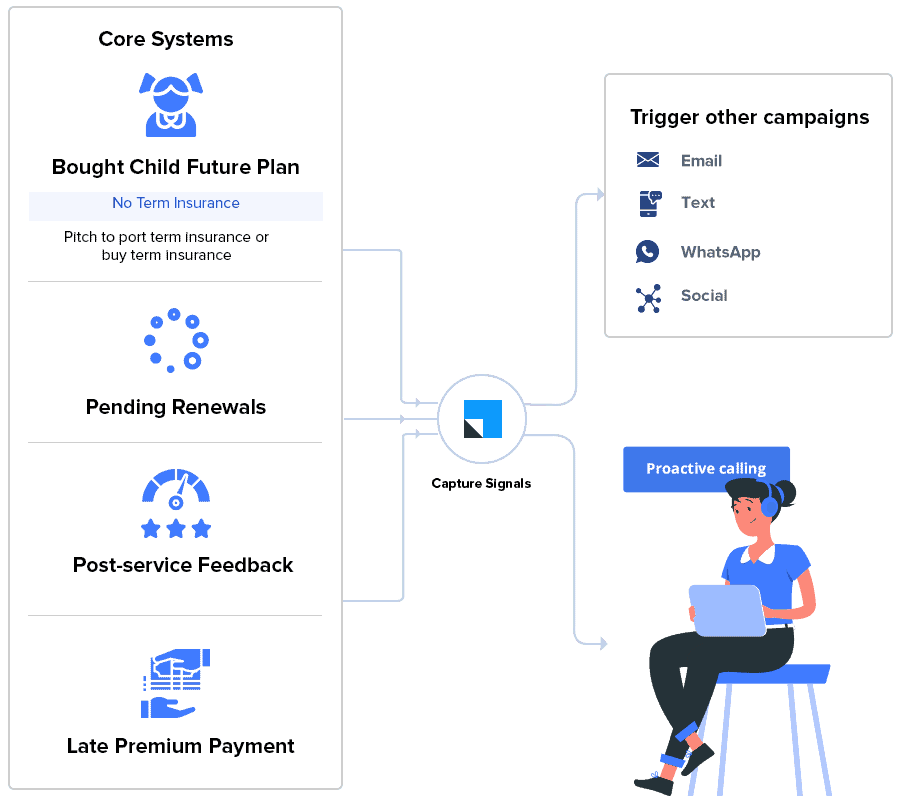
Automation software can read the call center guides and policy documents to yield better results, create workflows, and reduce the response times. It connects disparate systems so that the call centre staff does not have to go back and forth, collecting a client’s history. IA either decreases the handling time by solving the issue itself or ensures that only the right agent responds to the customer issue.
This will eventually bridge the gap between insurers and customers and allow more personalised service.
In a nutshell
As per a report by Juniper, Intelligent automation adoption will boom over the next five years, with more than 65 percent of carriers adopting the technology by 2024. The study found that they’ll do so to cut operational costs and remain competitive as they counter flat premium growth.
Keeping up with growing customer demands can be difficult, but not with intelligent automation assisting you. It can help you track your prospects and customers, identify what they want and need, and initiate relevant actions to enhance their experience.
It will help in delivering significant benefits such as:
- Efficiency, by automating the mundane tasks and minimising manual data-handling.
- Customer Satisfaction, by reducing the turn-around time and improving speed and accuracy.
- Scalability, by enabling faster decision-making processes and new business generation.
Not sure where to start your intelligent automation journey? Take a look at how LeadSquared’s Automation Solution for Insurance can help you reach your growth goals.






